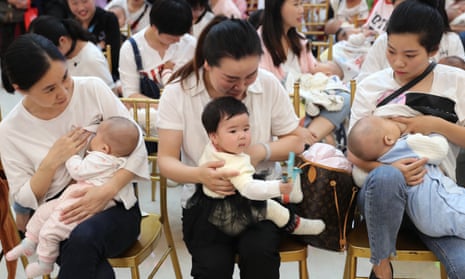China has done away with three family planning offices, in another sign the country may soon eliminate birth limits altogether after almost four decades of restricting family sizes.
China’s health commission said on Sunday that it had replaced three offices tasked with implementing family planning policies with one for “population monitoring and family development”. The new office would be tasked with “improving birth policy”, according to a statement posted online.
Speculation has mounted that China, with its quickly ageing population and low birth rates, will drop family planning limits entirely.
Over the last five years, China has phased out its notorious one-child policy that critics blame for millions of forced abortions and sterilisations. Now all couples in China are allowed to have two children. But many Chinese, faced with the high costs of education and housing and accustomed to one-child households, have chosen not to have a second child.
Last week, a draft civil code omitted all mentions of family planning and earlier last month, a government issued postage stamp for the Year of the Pig featured a happy family of five: two parents and their three piglets.
In March, the health commission removed “family planning” from its official name. Bloomberg reported in May, citing people familiar with the matter, that China was planning to scrap all limits on families by the end of 2018.
Observers worry the government will continue to intervene in the reproductive lives of its citizens, moving to a pro-natalist policy that is as aggressive as the one-child policy.
Last month, two Chinese academics called for requiring all working adults below the age of 40 to contribute to a “reproduction fund” to subsidise childcare costs for larger families. The proposal, which was widely criticised, drew parallels with the steep fines Chinese families once received for having more children.
On Chinese social media, users commented on the health commission reorganisation. One user wrote, “What’s the point of canceling these offices? Isn’t forcing people to have a second child still a form of ‘family planning’?
